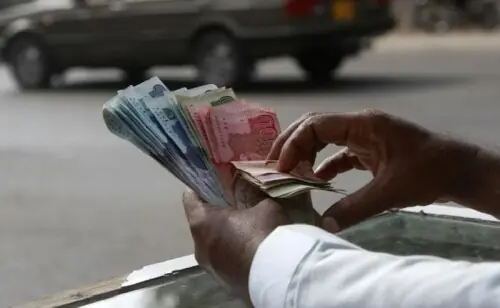Farewell lunch triggered ‘Lettergate’ dispute

WASHINGTON: The conversation that set off the so-called ‘Lettergate’ scandal took place on March 7 at a farewell lunch for the then Pakistan ambassador Asad Majeed Khan at his residence, which is also known as Pakistan House.
Diplomatic and official sources, who spoke to Dawn, said that although it was lunch, a note-taker also attended the meeting. The cable that Ambassador Khan later sent to Islamabad was based on the notes taken by the note-taker, who was also from the Pakistan Embassy.
US officials who attended the lunch included US Assistant Secretary of State for South and Central Asian Affairs Donald Lu and Deputy Assistant Secretary Lesslie C Viguerie. The Pakistani side comprised Deputy Chief of Mission Syed Naveed Bokhari and the defence attaché.
Since the March 7 lunch-meeting was held less than two weeks after the Russian aggression against Ukraine, the invasion dominated the conversation. The sources said the US side expressed its ‘disappointment’ with Pakistan’s decision to send its prime minister, Imran Khan, to Moscow the day Russia invaded Ukraine.
“They pointed out how the invasion had angered the entire American nation and explained why they thought Mr Khan should have postponed his visit,” one of the sources said.
Another source said Mr Lu hinted that “Washington believes the final decision to go ahead with the visit despite the invasion was that of Imran Khan” although some Pakistani officials had suggested postponing it.
Also read: PM Imran says 'foreign-funded conspiracy' out to topple his govt, claims to have evidence in writing
Ambassador Khan, according to these sources, argued that it was a collective decision and that Pakistan had been trying for a Moscow visit for years. And when the invitation came, they could not turn it down or postpone it.
The Americans, however, argued that Islamabad should have also “considered Washington’s sensitiveness” on this issue before going ahead with the visit.
The sources said the conversation then drifted to the current political environment in Pakistan, and Mr Lu pointed out that Washington was keenly watching the situation and the outcome of the no-trust move against the then prime minister would impact US-Pakistan relations as well.
One source claimed Mr Lu’s arguments were “alarming and far from routine”, but he did not threaten a regime-change. The source also claimed that no one attending the meeting felt that the Americans were hatching a conspiracy to topple the Pakistan Tehreek-i-Insaf government. “No, there’s no conspiracy. Nobody got that impression,” the source added. “But they did say the outcome will impact bilateral ties, which can be interpreted either way.”
The sources said the Americans never concealed “their disappointment” with Pakistan over Mr Khan’s Moscow visit. They claimed that Army Chief Gen Qamar Bajwa had planned to visit Washington in April, but postponed it after learning how the Americans felt about Ukraine.
Read more: Donald Lu evades question about Imran's allegations
“I never thought it was a US conspiracy, but it triggered certain reactions that impacted the domestic political situation in Pakistan,” another source said. “What Mr Lu said reflected what the Biden administration feels and thinks. It was very unusual. Not one bit routine.”
The source claimed that the defence attaché’s presence in the lunch-meeting, and his earlier engagement with US officials on the Ukraine issue, explained why Gen Bajwa’s comments on Ukraine “marked a significant departure” from Imran Khan’s policies on this issue.
Former prime minister Khan argued that Pakistan made a mistake by joining the West during the Cold War, it should remain neutral in the Russia-Ukraine conflict and refused to condemn Moscow’s invasion.
Addressing a seminar in Islamabad on April 2, Gen Bajwa had slammed Russia’s military attack on Ukraine, calling for immediate cessation of what he described as a “huge tragedy” inflicted on a smaller country.
On Thursday, the military’s media wing — ISPR — also dismissed Imran Khan’s allegations of a US conspiracy, although it acknowledged that Washington had used language in the lunch-meeting that amounted to interference in Pakistani affairs.
The ISPR chief pointed out the National Security Council’s meeting on this issue expressed “grave concern” at the communication from Washington, but did not use the word ‘conspiracy’.
On April 8, in his last address to the nation as prime minister, Mr. Khan reiterated his allegations that a senior US diplomat threatened a regime-change in Pakistan.
In another statement, Mr Khan also named the official — Donald Lu — who allegedly made that threat during a meeting with Ambassador Khan.
On April 10, while commenting on Mr. Khan’s claim, a US State Department spokesperson Jalina Porter said: “Let me just say very bluntly there is absolutely no truth to these allegations.”
Published in Dawn, April 17th, 2022


































